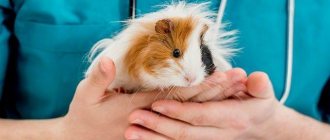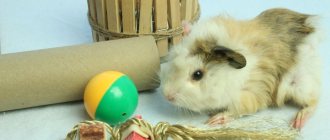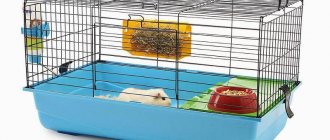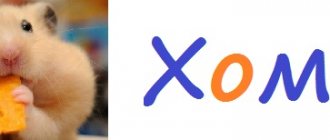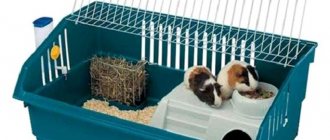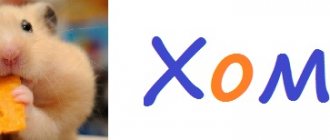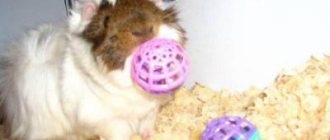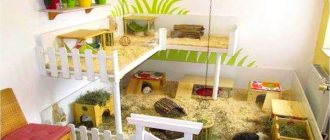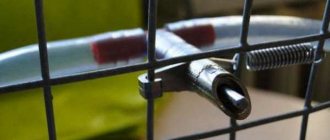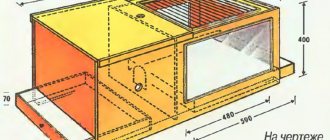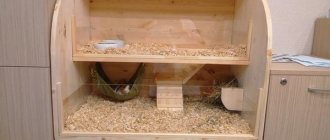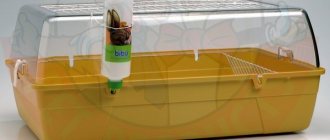!!! The guinea pig is a herbivore, so it does not have fangs. There are 2 incisors below and above, also 2 premolars and 3 molars on the left and right on both jaws. Therefore, the answer to the question of how many teeth a guinea pig has is 20. They grow throughout the rodent’s life. This has an evolutionary meaning: the animal is constantly gnawing and chewing something. If the guinea pig's teeth did not constantly grow, then by the second year there would be nothing to chew.
In a healthy pig, the length of the teeth and the shape of the upper edge can change throughout life: this depends on the animal’s diet. With the right diet, you don’t need to worry about your teeth - their length will adjust on its own.
Dental problems in guinea pigs
Guinea pigs are immune to tooth decay, but just like humans, they can have an abnormal bite. It is formed due to genetic mutations. Therefore, breeders do not recommend mating animals of the same family. Dental diseases also occur for the following reasons:
- teeth break off due to gnawing on the metal bars of the cage : this occurs due to the fact that the guinea pig does not have enough roughage or there are no twigs on which it can grind its teeth;
- due to the fall of the animal, its teeth break off , shift, or sink into soft tissues;
- the incisors grow so long that they cut into the cheeks, causing an abscess . This is the result of a lack of roughage or feeding with easily digestible food, which is why the guinea pig quickly becomes full and there is no need to chew;
- teeth wear down too quickly - a sign of vitamin C deficiency, as a result of which the tissue does not have time to form;
- break off, split, crumble - lack of calcium;
- the roots lengthen - this happens when the animal eats hay treated with herbicides. These substances contain fluoride, which accumulates in the guinea pig's body and leads to lengthening of the roots of the teeth;
- During the aging process, teeth shift and eating becomes impossible.
When to see a doctor
The most common reasons for visiting a doctor are:
- Uneven chipped tooth
- Very sharp edge of a broken tooth,
- Damage to the oral mucosa,
- The appearance of purulent wounds and ulcers on the gums,
- Increased salivation
- The appearance of an unpleasant odor from the animal’s mouth,
- The appearance of signs of the wrong sign,
- Lack of appetite,
- Simultaneous loss of more than three teeth.
All these reasons are easy to identify when examining the oral cavity. Only a veterinarian can correct the situation and prescribe, if necessary, proper treatment and nutrition. Self-medication can make the situation worse.
Symptoms of dental diseases
An attentive owner will quickly detect dental disease in a guinea pig. Vivid symptoms:
- the animal chews as if it is about to spit out the food;
- when chewing, the ears move strongly;
- purulent mucus is released from the nose and ears;
- the guinea pig chews food on one side of its teeth;
- the upper incisors protrude strongly from the mouth;
- she began to chew more slowly than before;
- chews the skin of an apple not as quickly as its pulp;
- Unchewed pieces fall out of the mouth;
- spits food back;
- the pig squeaks from hunger, sniffs the food, but does not eat it;
- drooling heavily;
- the animal has lost weight;
- the incisors are beveled to one side;
- seals on the cheeks or on one side;
- The pig's tears are flowing.
A combination of several symptoms will help clarify the picture of the disease. An accurate diagnosis will be made by a veterinarian when examining the animal.
Identifying problems
A caring owner will suspect in time that something is wrong with his pet’s teeth. The injury is obvious, but in all other cases you need to observe the animal. There are moments that any owner can see without the help of a doctor, simply by examining the animal.
See if the condition of the teeth deviates from the physiological norm:
- whether the incisors are not closing;
- are the teeth overlapping each other?
- Are they cramped at an angle?
- Are they protruding too far forward?
It’s not just your teeth that need to be examined regularly: discharge from the nose or eyes can indicate the onset of an abscess. The owner should be alerted by the animal's changed behavior, its stool, which is different from usual, and its worsened appetite. Of course, refusing to eat is a serious sign of illness. Since guinea pigs are small animals, they lose weight very quickly without proper nutrition. It’s better to catch it before the rodent turns into “skin and bones,” that is, before anorexia sets in.
How to identify subtle symptoms?
Perhaps the animal begins to have difficulty chewing food, which means problems with its teeth, if you agree with even one of the following statements.
- The rodent chews the piece in a peculiar way, as if it tastes it and cannot spit it out.
- The animal takes pieces of food into its mouth and spits them out.
- Guinea pig ears are very mobile while chewing.
- The pet’s chin is constantly wet from saliva (the teeth are ingrown, the mouth does not close completely).
- The guinea pig prefers to chew on only one specific side of its jaw.
- The pig eats more slowly than its cagemates.
- During the chewing process, unchewed pieces of hard vegetables (for example, carrots) fall out of the mouth.
- When food is served, the rodent becomes interested, rushes to it, but does not eat.
- Unable to tear off or bite off pieces of food.
- In the process of eating an apple, it is more difficult for a pig to eat the skin than the fruit itself.
Don't miss out on weight loss!
The most obvious sign that your pet's teeth are not doing well is loss of muscle mass. Any dental problems are immediately reflected in the speed and quantity of food eaten, that is, in the weight of the animal. Even if the owner does not understand the structure of his rodent’s teeth at all, he is able to control its weight.
Important! If your guinea pig doesn't lose weight within a week, his teeth are probably fine.
To do this, you should make it a rule to weigh your guinea pig once a week. This simple measure will help you quickly recognize impending troubles and provide timely treatment before the condition becomes advanced.
Return to content
Diagnostics
The initial examination takes place without anesthesia. An assistant gently holds the guinea pig while the veterinarian examines the oral cavity. If there are obvious painful symptoms, the rodent is examined under general anesthesia. The doctor feels the cheeks and takes an X-ray of the jaws. This is how root growth is detected, because visually everything is normal, but it hurts the pig to chew.
How to take care of your teeth
Teeth do not require special care. They wear down due to the presence of hay and young thin twigs in the diet. The fact that the chewing apparatus is in order is indicated by the pet’s good appetite.
Important! The basic dental rule that applies to a guinea pig's mouth is that if the guinea pig's weight does not change and she is actively feeding, then her teeth are fine.
But if you notice that your pet is eating cautiously or has begun to avoid certain types of food, then you will need the help of a veterinarian.
Treatment: broken tooth
People with a broken tooth go to the vet in 3 cases:
- the edge damages soft tissue, which creates a risk of an abscess;
- the tooth splits, which threatens the integrity of the root and complete loss;
- the broken edges are smooth, but they crumble.
In the first case, the doctor will trim the edge of the tooth. For this purpose, a special tool is used - bone forceps. It is strictly forbidden to do the procedure yourself: you need anesthesia, knowledge of how to grip correctly, and only this instrument. After the procedure, as well as in the other two cases - splitting and crumbling, the guinea pig is introduced to the diet with calcium and vitamin C. For the first 2 weeks, crushed food is served so that the animal can eat fully without pain. Buy calcium at a veterinary pharmacy: Calcidi, 1/3 tablet daily.
If the edges of the tooth are smooth, you can help your guinea pig at home: give a quarter of a vitamin C tablet (100 mg) daily.
Causes
The reasons can be either genetically determined or acquired.
In the first case, this may be the consequences of violating the rules of crossing (closely related variant) due to the fault of the breeder.
In the second case, the wrong diet is to blame. If the owner gives his pet food that is tastier (in his opinion), and often pampers him with soft dry food and store-bought treats, then the balance between rough and soft food is upset, the teeth stop grinding down, but do not stop growing. And then the above-described dental problem arises.
Choose food for guinea pigs in the catalog.
Elongated roots and malocclusion
In both cases, the pig is given a tight elastic bandage with which it must sleep overnight. The tourniquets put pressure on the jaw apparatus, which is why the animal tries to resist the pressure. As a result, the muscles become stronger, the teeth compress tightly and begin to wear down. Sometimes the veterinarian files the teeth and then puts on a bandage. After this, the incisors and molars grow to the required length with adjustments. The duration of wearing the elastic bandage is determined by the veterinarian. In parallel with this, it is recommended to massage on each side of the jaw: lightly massage with your fingers for 2 minutes.
Treatment of dental diseases
The method of treatment depends on the type of pathology and the degree of damage:
- As a result of grinding the incisors against the bars of the cage, falling, or fighting with another pet, the teeth can be damaged. Small chips are not a cause for concern. But if the incisors crumble, split down to the gum tissue, or have sharp edges that damage the cheeks, you need to consult a veterinarian. The doctor, under anesthesia, using a special tool, grinds the edges. After this procedure, the animal should be given only soft food for several days, and food rich in calcium and vitamin C should be included in the diet.
- If a guinea pig has lost 1-2 teeth, this is not a pathology. If you lose more elements of the dentition, you need to show your pet to a veterinarian. The cause of tooth loss may be gum disease or calcium deficiency. These pathologies must be treated.
- Correction of malocclusions is carried out under anesthesia. For an accurate diagnosis, an x-ray is taken, the fistulas are removed, the flux is removed, the incisors are ground down, and an elastic bandage is applied to give them the correct position.
- When roots grow into the nasal cavity, tumors and foci of inflammation appear. Pathology is diagnosed by radiography. If the anomaly is minor, the crowns are trimmed. In difficult cases, the tooth is removed. To restore the muscles of the muzzle, an elastic bandage is applied.
- A common disease is cheilitis. If a guinea pig has a deficiency of vitamins A, C, or reduced immunity, fungal microorganisms multiply in the oral cavity. A hard coating of green, brown, red or yellow appears on the enamel of the incisors and lips. It is useless to remove it; the crust will form again. You need to show your pet to the veterinarian, he will select the right medicine.
Help with teeth at home
You can try to pull out a broken tooth with your fingers. It hurts the pig more when it cuts the gum than when it is removed. There is no need to be afraid that a healthy tooth will come out - this one will sit firmly. After the procedure, you need to lubricate the animal’s gums with Iodinol. If after such manipulations the pig cannot eat even chopped food, it is necessary to feed it from a syringe: 6 g of food for every 100 g of weight.
If the teeth have shifted due to old age of the guinea pig, then the only way out is to feed it liquid food from a syringe for the rest of its days.
Feeding
You need to make sure your pig is eating. It is likely that you will divide food into tiny pieces and hand-eat them. In the case when the pig does not use drinking bottles, it is worth offering her water in a sponge, or giving her a juicy vegetable so that she does not become dehydrated. Trimming that happened arbitrarily, too short, or at the wrong time will interfere with gnawing and chewing food.
Vitamin C
If a tooth is lost due to a lack of vitamin C, this vitamin should be given in tablets or liquid form. It will stimulate bone growth, strong teeth and generally speed up recovery.
Prevention
Normally, the upper incisors are 1.5 times shorter than the lower ones: the lower ones are about 1 cm, the upper ones are 0.6-0.7 cm. You need to constantly monitor these parameters. Also, the following rules will help avoid dental problems:
- Take care of your pet. Train young children to handle your guinea pig so that they do not drop it. If your baby is afraid to pick up an animal, let him play with it on the floor or pet it from your hands. Falls can cause serious dental injuries.
- Watch the diet: the pig needs to be fed both cereals and hard root vegetables. Place branches of fruit trees so that the animal can gnaw on them.
- For pregnant females, introduce calcium and vitamin C into the diet. This is the prevention of genetic dental disorders in future offspring.
- Avoid crossing animals with consanguinity to eliminate problems with genetics, which manifests itself in the form of malocclusion.
Video:
ARTICLE 2: Guinea pig purrs when petted: how to pet it correctly
Signs that make it easy to determine a person’s character by their teeth
The shape of the teeth says a lot about a person, and you can determine the type of person by the teeth by paying attention to the following signs of the dentition:
Upper incisors
| People with long incisors They are usually the life of the party, but at the same time they persistently strive for their goals and are quite open in communicating with others. Large incisors most often occur in adamant, stubborn people who persistently pursue their goal. Despite their difficult nature, those with large teeth are distinguished by their sincerity. Large gap between teeth betrays the explosive nature of their owner. In addition, the hole indicates an addiction to risk, which is not always justified. |
Fangs
It is generally accepted that large, sharp teeth
, including fangs, speak of a person’s aggressiveness. In fact, this is not always the case. In most cases, such teeth reveal a loving person. They can also talk about determination.
For example, if a woman’s upper canines are large and long
, then this can emphasize her kindness and humor.
Evenness of teeth
| A person's character can be determined by the curvature or straightness of their teeth. Ideal dentition speaks of a balanced, calm character. Such people are not afraid to make decisions and take responsibility. They are eloquent, self-confident and ready to go towards their goal no matter what. Uneven teeth speaks of the good intuition of the owner of the teeth. |
A person’s small, fox-like teeth can also tell about a person’s character.
– owners of such dentition are often characterized by lust.
Protruding teeth
characteristic of stingy people.
Teeth size
Strong large teeth
testify to a person’s courage, strength and kindness. Such people are most often long-livers.
| They will tell you what character the girl has and small teeth – often their owners are quite secretive and reserved natures. They have a small number of friends. Often people around them simply do not understand them, considering them strange. What do sparse teeth a person does not need to think for long - such teeth indicate people with a wild imagination, who always have a fresh, interesting idea in their heads: they can often even be considered strange. They are also distinguished by their tenacity of character and always go towards their goal. |
Small teeth
, among other things, can talk about greed. Such people have a hard time parting with money and are certainly not ready to spend it on others, be it relatives or friends.
Presence of damage
The presence of damage to the dentition can also indicate the character of a person
So, if
the upper row of teeth is damaged
, this will indicate difficulties in unlocking your potential, and if there are
problems in the lower part (especially in the left)
, you should think about problems in family relationships.
Dental condition and health
Scientists have long proven that dental diseases can tell a lot about a person’s overall health.
Lower canines
They talk about problems with the liver, this can be either failure or various diseases.
Aching wisdom teeth
They will tell you about disturbances in the functioning of the intestines and heart.
Problems with the pancreas can be recognized by the “fives”. These teeth also indicate diseases of the bronchopulmonary system and small intestine.
| Damage to incisor enamel or pain they indicate diseases of the skeletal system - arthritis, arthrosis and others. In addition, pain may be a sign of problems with the bladder or kidneys. Often, in this way, the body screams about ear discomfort. At the same time, scientists clarify that first of all, the cause of dental disease must be sought at the dentist. Most cases are associated not with psychosomatics, but with a simple lack of proper oral hygiene, as well as the development of caries and other oral diseases. |
It is worth noting that official medicine does not recognize physiognomy as a science and casts great doubt on all its conclusions. Therefore, it is not worth labeling a person based on his appearance. But taking a closer look and comparing all the facts can be very interesting, because any theory needs careful testing and selection of facts.
How to treat
Treatment is mainly aimed at correcting the bite by trimming and filing down overgrown teeth. This is done using special tools.
In case of violation of the direction of tooth growth, weakness of muscles and ligaments, a jaw elastic bandage is used. It securely fixes the jaw, while the upper and lower teeth are closed. As a result, self-abrasion occurs, and increasing resistance restores muscle strength. Usually the bandage is applied after mechanical grinding with instruments.
Broken teeth are monitored to ensure they do not grow too long. If necessary, they are trimmed or ground down. In case of serious injuries, when sharp edges injure the mucous membrane or there is a hole in the gum at the site of a broken tooth, the oral cavity is washed with saline solution (after each meal).
For the most part, treatment for broken and fallen teeth is not required. Gradually they grow back, undergo natural grinding and take the desired shape.
